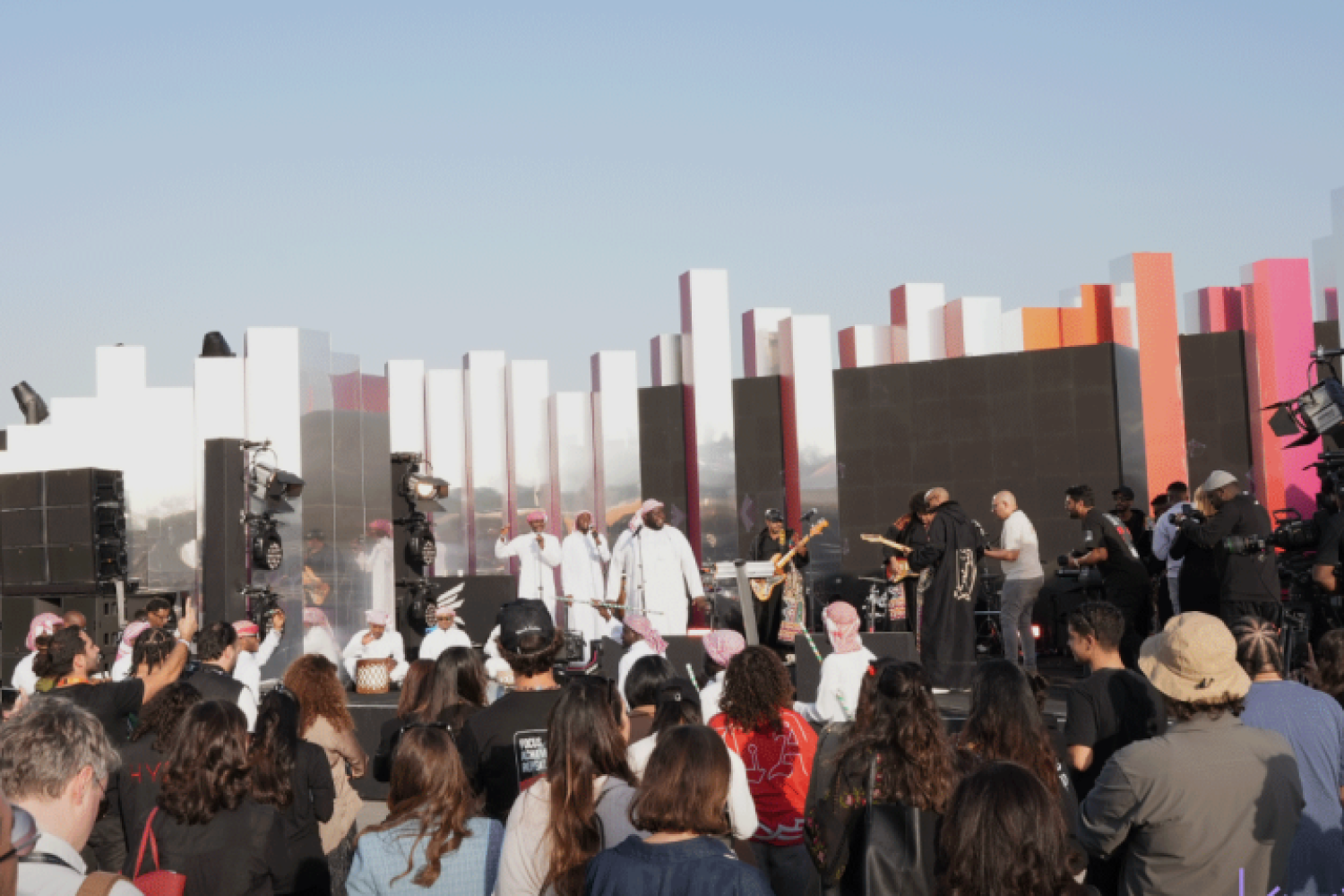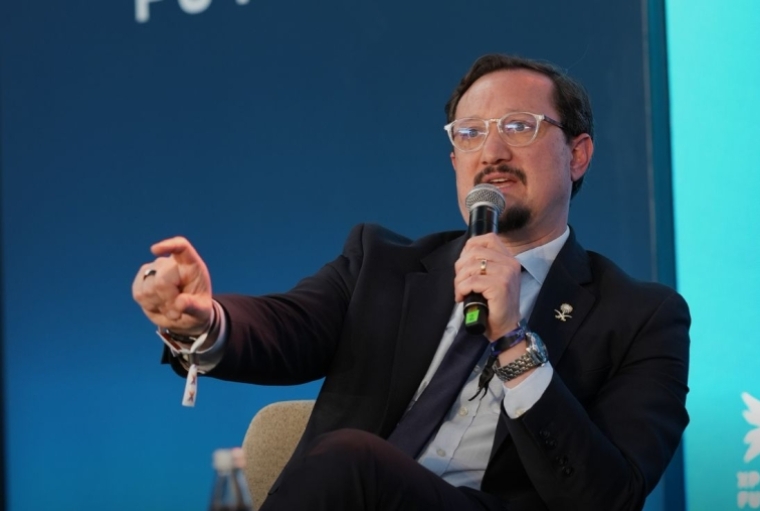
Photo Credits: Riyadh Music Week

Photo Credits: Riyadh Music Week
In a rapidly evolving musical landscape, Paul Pacifico stands at the forefront of Saudi Arabia's cultural transformation as the CEO of the Music Commission in Riyadh. With a deep commitment to fostering a vibrant and inclusive music scene, Pacifico is driving forward the nation’s ambitions outlined in Vision 2030. His extensive experience in the international music industry, combined with a passion for empowering local talent, positions him uniquely to redefine the music narrative in Saudi Arabia. In this interview, we delve into Pacifico's vision for the music industry, the role of culture in shaping identities, and his efforts to place Saudi music on the global map, all while navigating the challenges and opportunities of a dynamic and ever-changing environment. Join us as we explore his insights and aspirations for the future of music in the Kingdom.
What is your vision for music and how do you perceive its impact on cultures?
My vision for music is deeply rooted in a sense of service. With Vision 2030 at the forefront, we are witnessing transformative changes across Saudi Arabia that impact all aspects of the economy and society. I am fortunate to have strong support from our leadership and to work alongside a dedicated team at the Music Commission. My role is to empower this team to realize our vision, which centres on three key pillars: a diversified economy, a vibrant society, and accessible cultural opportunities for all. This aligns with our goal of fostering a proud nation and redefining the essence of the new Saudi Arabia.
Music is crucial in each of these areas. It can provide livelihoods and significantly contribute to GDP, as seen in markets worldwide. Furthermore, music enables individuals to engage with culture, express themselves, fulfil their potential, and pursue their dreams. A nation's sound often reflects its identity, a truth evident in countries like the U.S., India, the UK, and China.
I have the privilege of applying my international music industry experience to help structure the implementation of this vision. With 70% of the Saudi population under 35, there’s a palpable energy and creativity that we aim to harness. I aim to act as a lens through which we can translate this vision and dynamism into economically viable jobs and a sustainable ecosystem that promotes mutual reinforcement.
The music industry has experienced significant shifts, especially with the advent of social media, marking a revolutionary period of change. Do you think there is another revolution coming?
In my experience, the music industry is in constant revolution, whether it was the Napster era of the early 2000s leading into downloads and streaming, the cassette era, or the invention of synthesizers and even the piano. Each wave of technology has brought disruption. This makes music dynamic and creative, as artists respond to societal changes. While technology is a huge part of that evolution, the fundamental ways music connects with emotions remain unchanged. The medium may change, and the discussion topics may shift, but music’s ability to resonate emotionally persists.
Can you tell us what you are doing to put the Saudi music scene on the global map?
We have a tremendous opportunity to start this journey in the 21st century. As we discuss building the music industry, it's clear that if we were to start from scratch, we wouldn't approach it the same way. However, we're not just making the best of our current situation; we are actively constructing it. We have technology, awareness, and a global perspective on our side, coupled with the important trend of localization. Initially, there was concern at the start of the streaming era that the globalization of platforms would homogenize music, diminishing diversity and local appreciation. Surprisingly, the opposite has occurred. While global stars do exist, every market has seen local artists thrive.
For instance, recent statistics revealed that in Brazil's top 100 streamed artists, only one was not Brazilian, and that was The Weeknd, who ranked 99th. When you experience performances here, you can feel the warmth and joy coming from the artists, regardless of the genre, whether it’s metal, rap, or classical Arabic music.

Paul Pacifico
Do you think this pulls in the locals?
Absolutely. This is our focus. Geographically, Saudi Arabia is a vast country, comparable in size to Western Europe and about eight times the size of California. With a fast-growing population expected to nearly reach 40 million, including 8 million in Riyadh alone, we are strategizing at three levels: local, regional, and global. It’s exciting that local Saudi artists can have a sustainable career in a robust domestic market. Their regional success can lead to even greater opportunities, and if they break into the global market, the potential is limitless. What’s invigorating is the creative diversity due to the country's size and demographic variety. There is also a palpable hunger for culture, as this new wave of expression emerges. While culture isn’t new here—there's a rich musical tradition that spans thousands of years—what’s novel is the effort to create a structured music sector. We are not creating music from scratch; instead, we are establishing a new framework for an already existing cultural foundation.
What type of music influences you?
Music has always been a significant part of my life, as I grew up in a musical family. I started playing the violin at the age of three, with my grandfather as my teacher. Later, when I was 15, I discovered the harmonica and eventually became a professional musician. I’ve had the privilege of playing alongside many artists I admire. One aspect of music that I particularly cherish is its ability to transcend borders and break down barriers, whether they be linguistic or stylistic. A musician who has profoundly influenced me is Balaji Srivastava, a sitar player from Uttar Pradesh living in London. I have admired his work for many years, and I was fortunate enough to work with him at one point. I remember a memorable gig where our bands performed in different spaces. Balaji came out to joke about playing blues sitar, and we ended up jamming together. It was an extraordinary experience, showcasing the power of musical exploration that can arise from diverse musical backgrounds and ideas. The feeling of connection, conversation, and mutual understanding through music is truly unparalleled. Among all the gifts music brings me, that sense of connection is the most precious.
When planning the Soundstorm festival with MDL Beast, did you have a specific vision or concept in mind regarding the artists and overall aesthetic?
Middle Beast is responsible for Soundstorm, and it's become a massive success—one of the biggest festivals worldwide. The variety of artists on stage is impressive and a true testament to their efforts. The chance to combine several landmark events in Saudi Arabia, such as the XP Music Futures Conference, Billboard Arabia Awards, Soundstorm, and various fringe events that activate the entire city of Riyadh, is what makes this unique. The policy-oriented initiatives we’ve implemented this week, like the Music Cities Convention and Awards and the Music Makers Summit, show that music thrives on a multifaceted foundation.
If it were only about concerts, that would be fine, but it wouldn’t be sustainable. Education is vital, but it’s not sufficient on its own—it's like only eating broccoli. A balanced approach is necessary, combining all elements. Riyadh Music Week embodies this balance: it includes the exciting, fun aspects alongside the more serious ones. As for artists I'm looking forward to, I truly enjoy them all. I’m excited to see Eminem, Muse, Linkin Park, The Roots, and the Saudi artists performing.
Soundstorm showcases diverse talent, featuring Saudi DJs and rappers, alongside the traditional Arabic music of artists like Abdul Majid Abdullah, performing with ouds, canons, and nais. This diversity reflects the cultural curiosity of the audience, who are eager to experience it all, moving from one stage to another. It captures the essence of a festival—a celebration of a young, vibrant, and eclectic population.
What are your plans for the future?
Looking ahead to 2025, we have several ambitious programs lined up. One key initiative is introducing music into the public school system for the first time. This year, we trained 26,500 kindergarten teachers who will be ready to teach music in 2025.
Additionally, we are excited about the upcoming second edition of the Riyadh International Jazz Festival. The first edition of our opera training program in Europe is also wrapping up, and we look forward to seeing the development of the talented performers and artists involved. It's truly an exciting time for us.